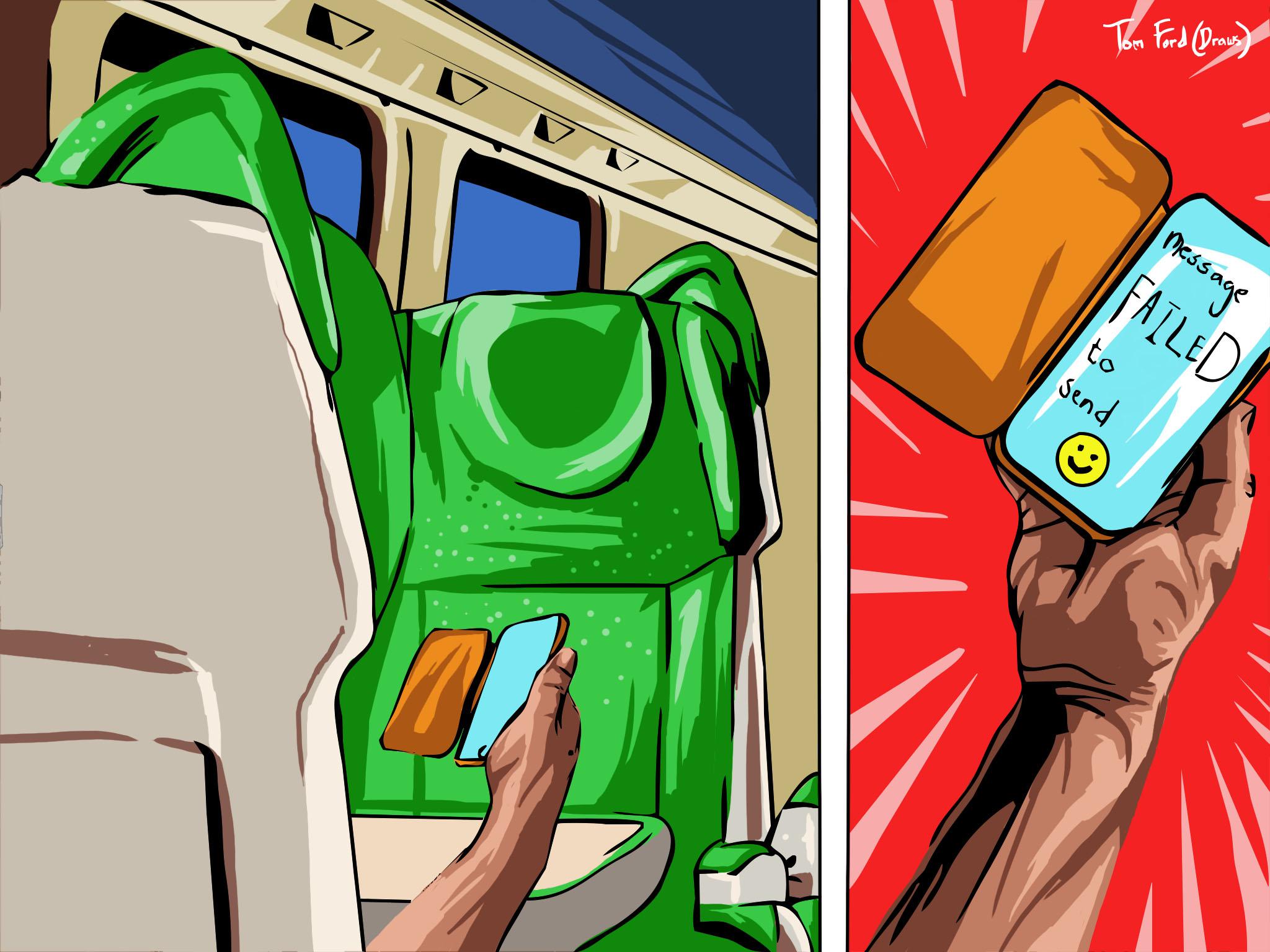Are you ignoring my message?
You can’t ask me that! Continuing her series tackling socially unacceptable questions, Christine Manby explores our obsession with getting an immediate text back

The inexorable rise of technology has brought with it many new and difficult questions that humanity is struggling to answer. Is technology good or bad for us? Is social media addiction fracturing any real sense of community?
Will the robots that are already stealing our jobs take over altogether and turn us into meat-based slaves?
While you ponder a future in which the toaster sighs as it tells you you’ve bought the wrong sort of bread again and the car has a strop because you insist on back-seat driving even though there’s no longer a steering wheel, there is one question that requires a far more urgent response.
Did you get my message?
Did you? Only I sent you a text an hour and a half ago and you still haven’t responded. My phone says it was delivered but maybe it didn’t really go through. I’ll try again. Oh, right. So now my phone’s telling me that you did read my first text two minutes after I sent it yet you still haven’t replied.
Seriously? How long does it take to type “OK”? Why haven’t you got back to me? Are you ignoring me? Have you dumped me? What’s going on? Are you dead?
Of course, what really happened is that the recipient read your text as they were boarding the Eurostar at St Pancras International en route to a summit dedicated to generally saving the earth. They couldn’t get a signal for the first 20 minutes of their journey (that fast bit from London to the coast is a cell-hole).

Then they thought their answer had gone through when it hadn’t. They didn’t notice “message not sent” until they’d got to France and then they weren’t sure whether sending you a text from the continent would cost a tenner (it won’t. At least not before Brexit).
So, long story short, they thought they would wait until they got to the hotel and had wifi, so they could send a free WhatsApp. In the meantime, you’ve gone from asking “do you want to come to supper?” to “are you seeing someone else?” faster than you can get from Oxford Street to the Champs-Élysées on a day the SNCF isn’t striking.
In the olden days, before most households even had answer-machines, it was much harder to feel rejected. If the person you were waiting to hear from didn’t call when you hoped they would, you could kid yourself that they must have tried during that 10-minute interval while you were at the corner shop.
The answer-machine was the beginning of the end of those halcyon days of telephonic ignorance but even then you could tell yourself that your flatmate might have accidentally erased your beloved’s message from the tape.
There was simply no way of knowing for sure… Until the advent of BT’s 1471, which could tell you exactly who called while you were out buying cigarettes. However even then that “number not available” still might have been the love of your life rather than someone asking whether you’d had an accident, right?
Nobody calls anymore, of course. While as of 2016, more than three quarters of the UK adult population owned smart phones, less than a quarter ever used them to make actual old-fashioned voice calls.
Daisy Buchanan explained the millennial point of view. “We’re in touch with each other constantly, but written communication allows us to participate in the conversation at the pace we choose. We don’t have to worry about misreading anyone’s tone when the words are laid out in black and white.”
“Don’t have to worry about misreading?” As someone who insists on using grammar in texts and has never knowingly texted “U OK hun?” even when my other half has ignored five texts in a row, I would argue she is dead wrong about that.
Tone is impossible to guess in a text. Hence the rise of the GIF, in which little films of people using expressions you might once have seen on someone’s actual face in a real time face-to-face conversation explain everything you really need to know about that horrible one word answer “fine”.

But let’s go back to what happens when there are no words whatsoever “laid out in black and white”. Text messages and emails have quickly become the preferred communication media of people who hate to offend. Want to ask a difficult question?
There’s no longer any need to do it in person. Stick it in a WhatsApp. Don’t want to answer that difficult question? Pretend you never even saw it.
However, when you’re on the receiving end of the textual equivalent of the silent treatment, you can no longer pretend it’s not happening. Apple has robbed us of the comfort of denial now messages come with those dreaded tags “delivered” and “read”, which are automatically enabled on iPhone.
Those tags have given rise to the term “leaving me on read”, meaning that you’re being ignored and you know it. Perhaps even worse is Apple’s “typing awareness indicator” – that bubble with the dots in it – which lets you know when someone was going to respond to you but ultimately decided not to press “send”.
Think you’re being diplomatic by not getting back to that overly-persistent friend? The Harley Therapy company website has “you ignore texts, emails or even conversations” at number eight in their top 10 signs that you’re being passive-aggressive.
Dr Jean Twenge, author of Generation Me, sees both sides of the equation. In defence of the non-responders, she told Elle’s Alyssa Bailey, “When you’re already worried and stressed out, you probably don’t want to subject yourself to the worry and stress of telling someone ‘no’, so the easy way out is instead to ignore.”
However, for those of us waiting, she adds that not responding is “not always a kind way to behave. You’re not really taking the other person’s perspective, thinking what it’s like for the other person to wait.” Waiting for a response and turning the possible reasons why that response is not forthcoming while you do so (aka ruminating) is “one of the biggest risk factors for depression”.
In fact, recent studies have shown that not responding to someone’s effort to communicate can cause actual changes in the ignored person’s brain. The anterior cingulate cortex, the part of the brain responsible for detecting pain, is activated by feeling excluded.
Long-term activation of this brain structure can manifest itself in physical symptoms such as tiredness, headaches and even IBS. The more important to us the person ignoring us is, the more extreme the effects. No wonder “the silent treatment” is considered by many medical professionals to be a form of psychological abuse.
In 1901, when you could still use “that carrier pigeon must have been shot” as an excuse for not getting a message, George Bernard Shaw wrote in The Devil’s Disciple that, “The worst sin to our fellow creatures is not to hate them, but to be indifferent to them: that is the essence of inhumanity”.
Shaw was right. If taking 10 seconds (or less) to respond “OK” to an irritating text can prevent your partner, mother, friend or boss from going into a serious decline, isn’t it something worth doing?
Christine Manby has written numerous novels including ‘The Worst Case Scenario Cookery Club’
Join our commenting forum
Join thought-provoking conversations, follow other Independent readers and see their replies
Comments
Bookmark popover
Removed from bookmarks